The global Goat Evaporated Milk market was valued at USD 203.55 million in 2023 and is projected to reach USD 276.64 million by 2030, growing at a Compound Annual Growth Rate (CAGR) of 4.6% during the forecast period (2024-2030). The influence of COVID-19 and the Russia-Ukraine War were considered while estimating market sizes..
Goat evaporated milk is a concentrated dairy product made by removing about 60% of the water content from goat's milk through evaporation. It has a creamy texture, slightly caramelized flavor due to the heating process, and is commonly used as a substitute for regular evaporated cow's milk in cooking and baking.
Market Growth Drivers: Factors driving this growth include increasing consumer preference for dairy alternatives, rising awareness about the health benefits of goat milk, and the growing popularity of evaporated milk in cooking and baking applications.
Health Consciousness: Goat milk is perceived as easier to digest compared to cow's milk, making it attractive to consumers with lactose intolerance or dairy sensitivities.
Regional Insights: Growth is expected across various regions, with significant potential in North America, Europe, and Asia-Pacific, driven by both traditional culinary uses and new product innovations.
Product Innovation: Companies are likely to focus on product diversification, such as flavored evaporated goat milk or organic variants, to meet evolving consumer preferences.
Challenges: Challenges may include fluctuations in raw material costs (goat milk), regulatory constraints related to dairy product labeling and standards, and competition from other dairy alternatives.
Market Segmentation: Segmentation may include different packaging formats (cans, tetra packs), distribution channels (grocery stores, online platforms), and consumer demographics (health-conscious individuals, chefs and culinary professionals).
The global key manufacturers of Goat Evaporated Milk include Meyenberg and Avhdairy etc. in 2023, the global top five players have a share approximately % in terms of revenue.
Goat Evaporated Milk is?a concentrate made by removing half the water from fresh goat milk.?
This report aims to provide a comprehensive presentation of the global market for Goat Evaporated Milk, with both quantitative and qualitative analysis, to help readers develop business/growth strategies, assess the market competitive situation, analyze their position in the current marketplace, and make informed business decisions regarding Goat Evaporated Milk. This report contains market size and forecasts of Goat Evaporated Milk in global, including the following market information:
- Global Goat Evaporated Milk Market Revenue, 2019-2024, 2025-2030, ($ millions)
- Global Goat Evaporated Milk Market Sales, 2019-2024, 2025-2030, (K Units)
- Global top five Goat Evaporated Milk companies in 2023 (%)
MARKET MONITOR GLOBAL, INC (MMG) has surveyed the Goat Evaporated Milk manufacturers, suppliers, distributors and industry experts on this industry, involving the sales, revenue, demand, price change, product type, recent development and plan, industry trends, drivers, challenges, obstacles, and potential risks.
Total Market by Segment:
Global Goat Evaporated Milk Market, by Type, 2019-2024, 2025-2030 ($ Millions) & (K Units)
Global Goat Evaporated Milk Market Segment Percentages, by Type, 2023 (%)
Global Goat Evaporated Milk Market, by Application, 2019-2024, 2025-2030 ($ Millions) & (K Units)
Global Goat Evaporated Milk Market Segment Percentages, by Application, 2023 (%)
- Infant Food
- Milk Food
- Others
Global Goat Evaporated Milk Market, By Region and Country, 2019-2024, 2025-2030 ($ Millions) & (K Units)
Global Goat Evaporated Milk Market Segment Percentages, By Region and Country, 2023 (%)
- North America (United States, Canada, Mexico)
- Europe (Germany, France, United Kingdom, Italy, Spain, Rest of Europe)
- Asia-Pacific (China, India, Japan, South Korea, Australia, Rest of APAC)
- The Middle East and Africa (Middle East, Africa)
- South and Central America (Brazil, Argentina, Rest of SCA)
Competitor Analysis
The report also provides analysis of leading market participants including:
- Key companies Goat Evaporated Milk revenues in global market, 2019-2024 (Estimated), ($ millions)
- Key companies Goat Evaporated Milk revenues share in global market, 2023 (%)
- Key companies Goat Evaporated Milk sales in global market, 2019-2024 (Estimated), (K Units)
- Key companies Goat Evaporated Milk sales share in global market, 2023 (%)
Further, the report presents profiles of competitors in the market, key players include:
Outline of Major Chapters:
Chapter 1: Introduces the definition of Goat Evaporated Milk, market overview.
Chapter 2: Global Goat Evaporated Milk market size in revenue and volume.
Chapter 3: Detailed analysis of Goat Evaporated Milk manufacturers competitive landscape, price, sales and revenue market share, latest development plan, merger, and acquisition information, etc.
Chapter 4: Provides the analysis of various market segments by type, covering the market size and development potential of each market segment, to help readers find the blue ocean market in different market segments.
Chapter 5: Provides the analysis of various market segments by application, covering the market size and development potential of each market segment, to help readers find the blue ocean market in different downstream markets.
Chapter 6: Sales of Goat Evaporated Milk in regional level and country level. It provides a quantitative analysis of the market size and development potential of each region and its main countries and introduces the market development, future development prospects, market space of each country in the world.
Chapter 7: Provides profiles of key players, introducing the basic situation of the main companies in the market in detail, including product sales, revenue, price, gross margin, product introduction, recent development, etc.
Chapter 8: Global Goat Evaporated Milk capacity by region & country.
Chapter 9: Introduces the market dynamics, latest developments of the market, the driving factors and restrictive factors of the market, the challenges and risks faced by manufacturers in the industry, and the analysis of relevant policies in the industry.
Chapter 10: Analysis of industrial chain, including the upstream and downstream of the industry.
Chapter 11: The main points and conclusions of the report.
